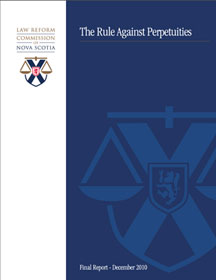
The Law Reform Commission of Nova Scotia has called on the province’s attorney general to scrap the centuries-old rule against perpetuities on trusts.
In a final report, released on its web site earlier this week, the commission called the rule “antiquated.” I
The rule, which dates back to a 17th century case in England, Duke of Norfolk v. Howard, limits the duration of trusts, meaning that if full ownership of property will not be transferred within “a life or lives in being plus twenty-one years,” then the gift of transfer is void.
The rule was meant to balance the rights of property owners to place conditions on its use, without allowing the restrictions to hold generations later, but lawyers complained that the complexity of the rule caused legitimate beneficiaries to be disinherited, mostly because of inadvertent errors in complex wills.
The commission notes that most common-law jurisdictions acted long ago to reform the rule and limit some of its harsher effects, but says Nova Scotia should go one step further, eliminating the rule altogether.
“There was very little support for a reformed version of the rule,” said John Briggs, the commission’s executive director. “In our consultations we heard from practitioners and other members of the public, and the overwhelming response was that the rule should be simply abolished.”
In places like Manitoba, Saskatchewan, many U.S. states, and Ireland, they have already abolished the rule, relying instead on existing legal rules to plug the gap. The report says courts in Nova Scotia already have the power to modify trusts and that it could act on a long-term trust that is causing problems with the consent of the adult beneficiaries. It proposes extending that power to approve changes even where beneficiaries dissent.